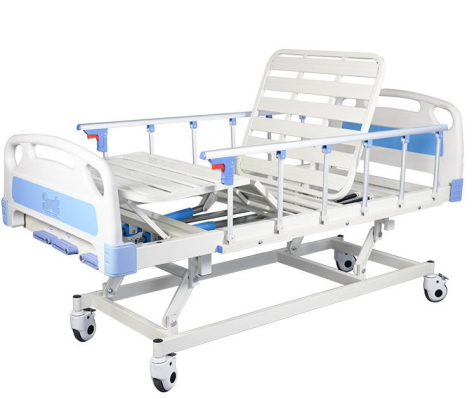Some Known Questions About Hospital Beds For Home Use.
Table of ContentsThe 10-Minute Rule for Hospital Beds For Home UseThe Definitive Guide to Hospital Beds For Home UseThe Basic Principles Of Hospital Beds For Home Use See This Report about Hospital Beds For Home UseHospital Beds For Home Use for DummiesGet This Report about Hospital Beds For Home UseHospital Beds For Home Use for Beginners
There are 3 major kinds of medical facility beds: guidebook, semi-electric, and fully-electric. More types of medical beds exist and they are provided below. These beds make use of hand cranks to adjust the bed's height and increase and reduce the head and the foot. Hand cranks are generally found at the foot of the bed and need an individual that is literally efficient in operating.
Semi-electric beds have an electric motor to increase and lower the head and foot portions of the bed. Clients and caregivers adjust the positioning by pushing switches making use of a hand necklace. The elevation of the bed is changed manually with a hand crank. Full-electric beds have an electric motor that can increase the head and foot sections of the bed along with the whole elevation and positioning of the bed.
Not known Details About Hospital Beds For Home Use
There are numerous types of hospital beds, each designed to fulfill particular person needs. Below are some usual types: This is the most common type of health center bed, developed for basic clinical use.
Reduced to the ground than a standard bed. This kind of bed is created for bigger individuals, with a broader structure and greater weight capability than a conventional bed.
This sort of bed is made for seriously unwell patients who require open monitoring and specialized medical equipment such as ventilators and infusion pumps. This sort of bed is designed for usage throughout labor and distribution, with flexible placements and attributes to sustain the mom and infant during the birth process.
Facts About Hospital Beds For Home Use Revealed
Multiple feature and the devices carry out expanding grip to different parts of the vertebra and the extremities without relocating the human body. These are simply a few examples of the kinds of health center beds offered. The particular kind of bed utilized will certainly depend upon the client's problem, medical demands, and other factors.
Right here is things you require to know. A one-function health center bed is a medical bed that permits an individual to move only the head or foot area up or down. A 2 function health center bed commonly describes a kind of medical bed that has 2 adjustable features to help individuals in medical facilities or treatment facilities.

The Of Hospital Beds For Home Use
A 7-function ICU bed is a sort of medical bed that supplies numerous adjustable features to sustain seriously ill people in a critical care unit (ICU) (hospital beds for home use). The 7 features generally include: additional resources Back-rest adjustment: The back-rest can be adapted to numerous angles to help the client sit up or relax conveniently
Height change: The bed can be increased or reduced to make it much easier for individuals to obtain in and out of bed, and for caregivers to provide care. Trendelenburg setting: The whole bed can be tilted to advertise blood circulation and circulation in the body. Reverse Trendelenburg setting: The bed can additionally be slanted in the contrary instructions to promote blood circulation and blood circulation in the upper body.
While even more cost effective than electrical models, these beds call for physical initiative for changes. The primary advantages of manual beds are their cost and reliability, as they do not rely upon electrical power. The requirement for hand-operated initiative can be a limitation in situations where fast his explanation changes are necessary or where caretakers face physical obstacles.
The 9-Second Trick For Hospital Beds For Home Use
Semi-electric hospital beds supply an equilibrium of guidebook and electric controls. These beds give an excellent middle ground between guidebook and completely electrical alternatives, offering ease of use without the full price of electrical designs.
Semi-electric beds are appropriate for individuals who need moderate changes to the head and foot areas yet can handle without regular height changes. This makes them a cost-effective solution for those looking for convenience and benefit without the need for constant repositioning. Totally electrical healthcare facility beds feature electrical controls for smooth modifications to the height, head, and foot areas.
Specialized healthcare facility beds, such as ICU beds, long-lasting treatment beds, and bariatric beds, are meticulously created to deal with specific clinical needs. These beds offer customized look after diverse person groups, improving both end results and convenience. In the adhering to areas, we will explore the primary sorts of specialized medical facility beds, outlining their certain benefits and applications.
With years of experience in producing electric direct actuators - hospital beds for home use and close collaboration with the health care industry, TiMOTION is well-positioned to supply trustworthy healthcare options. Our vertically incorporated business handles every step of the production procedure, from design to actuator setting up, ensuring we supply extraordinary worth and tailored services tailored to your details requirements
Hospital Beds For Home Use Things To Know Before You Buy

To read more concerning integrating these find out this here modern technologies into your items, contact us today. Additional reading:.
Information is sourced from the Medicare Cost Report.

The Ultimate Guide To Hospital Beds For Home Use
A health center bed is a bed made especially for clinical functions. It is not only an area for people to relax, however also a system for medical operations. Unlike regular home beds, healthcare facility beds typically have adjustable attributes, which can assist in medical staff to make numerous modifications according to the needs of people, such as altering the height, disposition, and support angle of the back and legs of the bed.